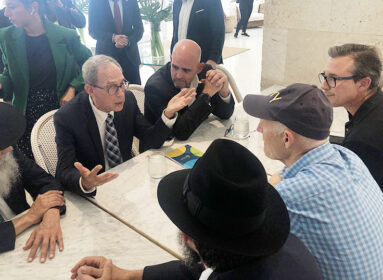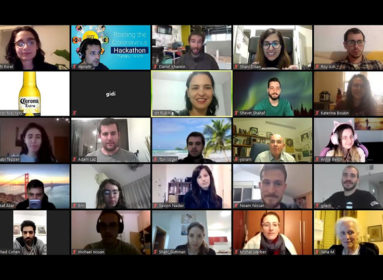By Cindy Mindell
WEST HARTFORD – In 1984, Congress passed the Equal Access Act, requiring public schools to provide equal access to extracurricular clubs. As a result, many student organizations, like Bible study groups and gay-straight alliances, were born.
It took nearly 20 years for the organized Jewish community to create its own response. In 2002, the Orthodox Union’s (OU) youth group, National Conference of Synagogue Youth (NCSY), initiated JSU, an independent 501(c)3 organization dedicated to teaching Jewish culture to high school students of all backgrounds.
JSU clubs were established by students at public high schools throughout the U.S., including Connecticut, staffed by adult NCSY employees.
While initiated by OU, the executive and lay leadership of JSU over time became multi-denominational. In July, that leadership decided to rebrand the organization as “Jewish Student Connection” so as not to advocate any particular Jewish denomination over another. Subsequently, some clubs continued to bear the “JSU” or “Jewish Student Union” name and continue to be run by the OU.
Now there are Jewish Student Connection clubs in high schools throughout Fairfield County. Before the reorganization, there were three Jewish Student Union clubs in the state – at Hall High School in West Hartford, West Haven High School, and Wilbur Cross High School in Hamden. The Hall High club is the only remaining one, and is now an independent and local non-denominational youth group. The club’s director, Moshe Waren, a Hall graduate and professional music agent, describes the group as “a Hillel-type of environment for high-school students” meant to enhance Jewish identity and strengthen teens’ connection to Israel.
Started in 2006 by student Dan Bloom, the Hall JSU is run by a student board and offers programming planned according to members’ interests – Jewish holidays, Israeli culture, and discussion topics often introduced by a guest speaker.
“JSU bridges the gap between bar/bat mitzvah and college, a time when there’s often no Jewish connection,” Waren says. “This kind of activity helps teens remember their Jewish identity when they get to college, where they’re more likely to be part of a Jewish campus group like Chabad or Hillel.”
Weekly after-school meetings attract 25 to 30 students, with double that number for Jewish holiday celebrations and around 15 for monthly Shabbat dinners in the community. Participants come from all Jewish denominations, as well as unaffiliated and non-Jews. Waren says that JSU serves as a portal for Jewish students to become more Jewishly involved in other ways – participating in regional JSU activities and joining Jewish youth groups; taking part in The Jerusalem Journey, a four-week NCSY program in Israel for public high-school students. The biggest impact JSU hopes to make on a teen, however, is after graduation.
“One really nice thing about JSU is that it’s user-friendly,” Waren says. “It’s right where they are, they can come if they want, and they don’t have to be driven anywhere or pay dues.”
The most revealing perspective on the club’s impact comes from students who can look back on the experience after college. Albert Engle got involved in JSU during his sophomore year at Hall, in 2007, and graduated this month from University of Maryland, College Park.
“I was lured by the prospect of free food, but as soon as I got in the door, I realized that I had found a club that gave me a place where I felt I could belong,” he says. “I was Jewish, so this was my club, and I could feel comfortable there. I found that JSU both satisfied my desire for a Jewish place, but also nurtured a curiosity towards all things Jewish – which had existed all along, but now had a place to express itself.”
Engel expanded his knowledge on a wide variety of Jewish topics, from the halachic – Shabbat, kashrut, holidays – to Israel, to the Jewish approach to secular subjects. “My favorite activities were the ones that were the most student-driven,” he says. “For example, we had ‘Ask the Rabbi’ sessions, in which a local rabbi would come and answer whatever questions the students would throw at him. Many times, these would be very interesting questions, and the very fact that we, instead of our teachers, were the ones determining what we were learning was empowering.”
But for Engel, the most significant benefit went beyond the intellectual. “I also gained a self-confidence that grows from being in charge of one’s own identity,” he says. “For the first time, I was able to chart a Jewish identity for myself independent of the one that my parents had given me from birth.”
At University of Maryland, Engel became very involved in the Orthodox community. He plans to take an active part in the Jewish community in Cambridge, Mass., when he moves there to attend graduate school at Tufts University.
JSU’s greatest value to students, Engel believes, is the informal and student-led nature of the club. “It was the only teen program that I ever participated in, including denominational youth groups, that didn’t feel as though adults were telling us what to do,” he says. “As odd as it may seem, the fact that we met in school made it seem extremely non-school-like. This really made Judaism much more accessible that it seemed in a classroom. Teenagers respond to informal education.”
In addition to a faculty advisor, the other adult who assists Waren with the club is parent volunteer Julie Feldman, who got involved two years ago when her son was a sophomore and on the club board. Now she serves as a liaison to foster closer connections with other community organizations like greater Hartford’s Jewish Teen Learning Connection (JTConnect).
“One huge value of JSU is for Jewish teens coming into Hall who are not connected at their synagogues or involved in youth groups like USY,” Feldman says. “It’s so important for the community to offer as many ways for Jewish teens to stay connected. And JSU is the only one that comes to the kids, where they are – right at school. With so many of the kids busy with so many other activities and the demands of high school, this really works for some of them.”
“There’s another value of having the club that is most important to me, and that’s its vital contribution to the high school’s community atmosphere,” Feldman says. “So many schools across the country struggle with the issue of bullying. But Hall High doesn’t. I give a lot of kudos to the administration for working so hard to create an inclusive environment, one not only accepting of, but celebrating, diversity. Having an active JSU at Hall is a crucial part of that fabric. At every meeting, there are Jewish and non-Jewish kids, and there’s no better way to break down barriers and eliminate prejudice than embracing our diversity. You see the JSU posters on the walls, hear their announcements, see them in the freshman orientation video. For incoming Jewish students, whether or not they go to JSU meetings, having the JSU there is anchoring. .”
Waren hopes to help students expand JSU throughout Connecticut and into western Mass, in both private and public high schools, and in middle schools.
But the club faces funding challenges since the breakup of the national JSU organization, and now relies on local backing.
“It’s so important for our Jewish community to support JSU,” says Feldman. “We need this club for our kids and if we can get some steady support locally, financially and organizationally, maybe it could expand to Conard. I think it’s something that is a hidden gem in our community.”
Comments? email cindym@jewishledger.com.








 Southern New England Jewish Ledger
Southern New England Jewish Ledger















